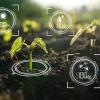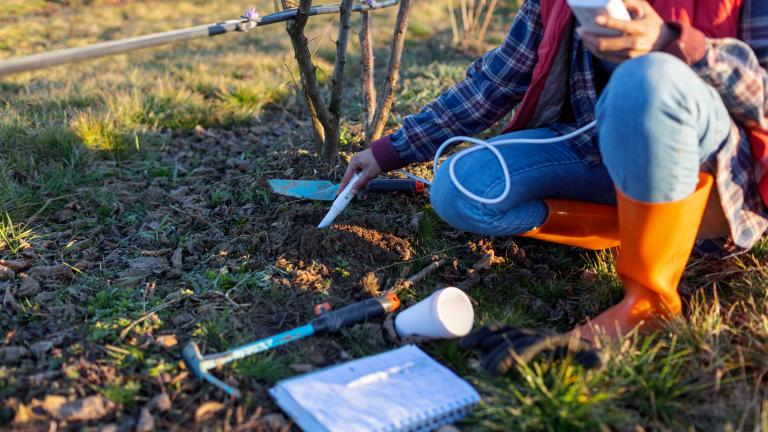
The European Commission has set an ambitious goal of transitioning towards healthy soils by 2030. As such, it is important to assess and monitor soil health metrics. The EU-funded AI4SoilHealth project will co-design, create, and maintain an open-access Europe-wide digital infrastructure founded on advanced AI methods combined with new and deep soil health understanding and measures.
The AI-based data infrastructure will evolve a Soil Digital Twin. The project will deliver a coherent Soil Health Index methodology, Rapid Soil Health Assessment Toolbox, AI4SoilHealth Data Cube for Europe, Soil-Health-Soil-Degradation-Monitor, and AI4SoilHealth API and mobile phone app. AI4SoilHealth will test the tools, collecting feedback from target users.
Mission
Challenge
We all depend on good soils. When healthy they capture carbon, improve yields, reduce flooding, and boost biodiversity.
But soils are under pressure from current farming practices, and the challenges are only increasing with the growing demand for food production.
Threats to soil health include loss of organic matter, loss of biodiversity, soil compaction from large machinery and loss of soil itself due to erosion.
It is estimated that between 60 and 70% of the EU’s soils are unhealthy.
Aim
If we want to reverse this trend, we need to understand which practices work and which do not. The climate crisis does not leave us much room for mistakes, and soil is complex. So we need to be able to map changes into the future so we can make the right plan for the right locality. For this people need the right measurement tools. The right tools will give land managers and policy makers the confidence to make changes to their farming practices which improve soil health and resilience.
Action
AI4SoilHealth project will create a free app that combines Artificial Intelligence and the latest soil health measurement techniques to help farmers and growers across Europe make changes to their management practices. To this project partners will spend the next 3 years collecting data from farms and pilot sites across Europe to build a model for this to work from. Along the way we will share our learning, educating people about the latest soil health measurement techniques and sharing stories from the European soil practitioner community.
Role of IIASA
Within the AI4SoilHealth IIASA’s research team contributes to the assessment of current soil-related policies, links to stakeholders, and identifies policies that facilitate implementation of the Soil Strategy, Green Deal strategies and other relevant agreements, soil health indicator identification, selection, and testing, development, and application of tools and methods for consistent pan-European soil monitoring, and upscale them to produce operational harmonized data services, and finally also to communication of messages, methods and tools among target stakeholders, policy-makers and the general public.
The key research focus of IIASA is on the development and application of AI-based open-source tools and methods for consistent pan-European soil monitoring, and upscale them to produce operational harmonized data services with a particular focus on the development of forecasting services for robust predictions of the soil health indicators and soil functions for the baseline year 2020 and future time horizons of 2030, 2050, 2100 and spatial downscaling of the predictions with fine-grained geo-spatial covariates for climate, terrain, and soil.
Partners
Partners of the AI4SoilHealth project are researchers, charities, and companies from across Europe who are working together to use artificial intelligence to monitor and predict soil health.
| Aarhus University | Denmark |
| MultiOne | Croatia |
| UK Centre for Ecology & Hydrology | United Kingdom |
| Institute for Soil Sciences | Hungary |
| Planet Labs | Germany |
| Thünen Institute | Germany |
| University of Zagreb, Faculty of Agriculture | Croatia |
| Technical University Hamburg | Germany |
| University of Zagreb, Faculty of Electrical Engineering and Computing | Croatia |
| Stockholm University | Sweden |
| Roma Tre University | Italy |
| University of Aberdeen | United Kingdom |
| OpenGeoHub | Netherlands |
| LUKE | Finland |
| Soil Association | United Kingdom |
| Aristotle University of Thessaloniki | Greece |
| Aalborg University | Denmark |
| SustInn | Netherlands |
| Max Planck institute for Biogeochemistry | Germany |
| NEIKER | Spain |
| ISINNOVA | Italy |
| INRAE | France |
| Sorbonne University | France |
| ETH Zürich | Switzerland |
| University of Basel | Switzerland |
| Bern University for Applied Sciences | Switzerland |
| Digit Soil SA | Switzerland |
| Grant agreement ID: | 101086179 (DOI 10.3030/101086179) |
| Funded under: | Food, Bioeconomy Natural Resources, Agriculture and Environment |
| Total cost: | € 9 960 358,50 |
| ËU contribution: | € 9 960 357,50 |
Related publications
Ippolito, T., Balkovič, J. , Skalský, R. , Folberth, C. , Krisztin, T. , & Neff, J. (2023). Predicting spatiotemporal soil organic carbon responses to management using EPIC-IIASA meta-models. Journal of Environmental Management 344 e118532. 10.1016/j.jenvman.2023.118532.
News

05 October 2023


